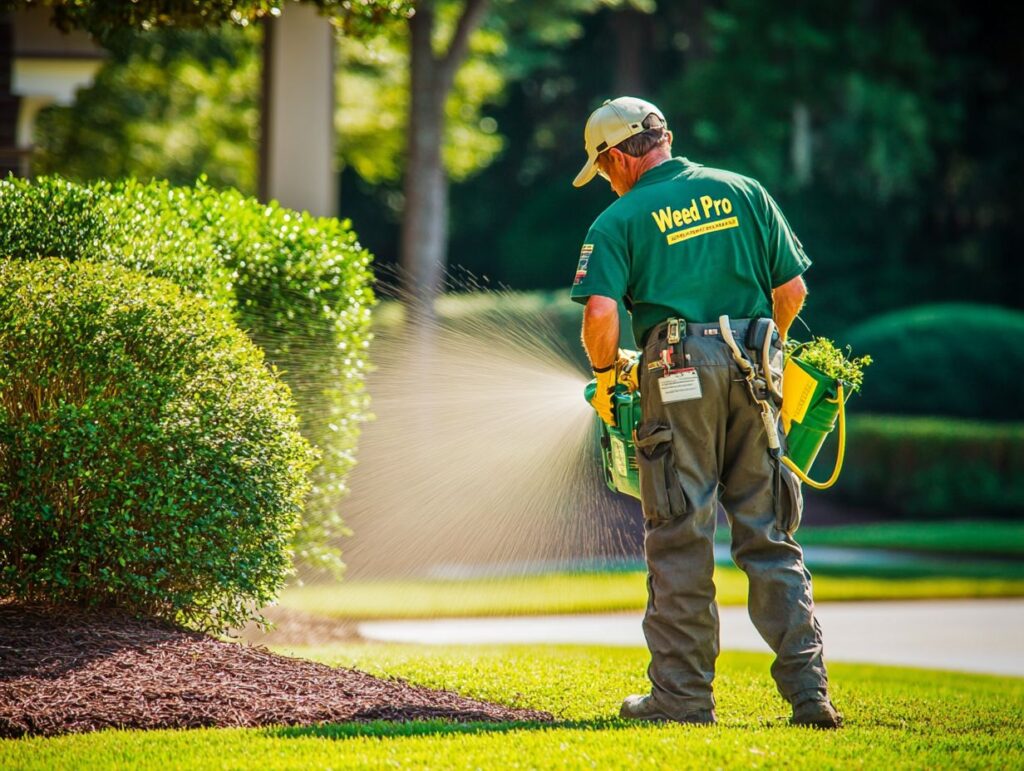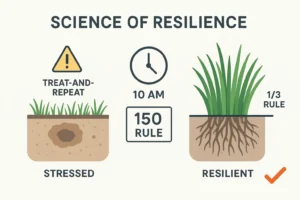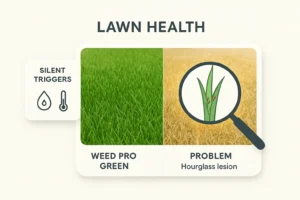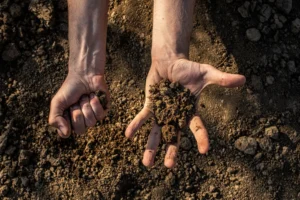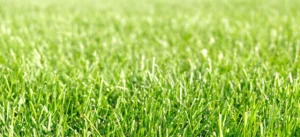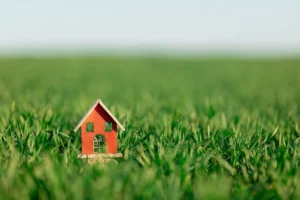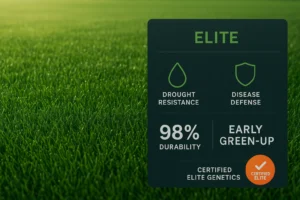In a city like Atlanta, where vibrant landscapes meet steamy summers and surprise downpours, picking the right mulch for your yard isn’t just about looks—it’s about performance. Sure, we all want that fresh, clean landscape finish, but the real MVP mulch also boosts soil health, controls weeds, and stands up to the southern climate.
That’s where Weed Pro comes in. We’ve tested, spread, and refreshed all kinds of mulch across the Atlanta area—and trust us, each type brings its own pros, quirks, and maintenance levels.
So, ready for a friendly showdown? Let’s pit pine straw, bark, and rubber mulch against each other in this ultimate mulch types comparison to help you decide what’s best for your garden beds, flower borders, and tree rings.
Pine Straw Mulch: The Local Favorite
Let’s start with the classic: pine straw mulch. Around Atlanta, this one’s practically a tradition. It’s lightweight, easy to spread, and gives off that rich, woodsy scent that makes your yard feel fresh and tidy.
Pine Straw Pros:
- Great for Sloped Areas: It clings to hillsides and doesn’t float away easily in a downpour.
- Weed Suppression: Dense layering keeps weeds from seeing the sun.
- Budget-Friendly: Usually, the most affordable mulch option around.
- Southern Aesthetic: Blends beautifully with traditional Georgia landscapes.
Pine Straw Cons:
- Needs Seasonal Refreshing: It breaks down quickly—expect to refresh at least once or twice a year.
- Lower Mulch Longevity: Won’t last as long as bark or rubber.
- Can Be Flammable: Keep it away from grill areas or fire pits.
💡 Pro Tip: Pine straw decomposes fast, which also means it feeds your soil naturally over time—a plus for your plants and a little bonus eco mulch choice point.
Bark Mulch: The Classic Workhorse
Next up, we’ve got bark mulch—a timeless favorite that delivers on both aesthetic value and soil improvement. Whether you go for shredded hardwood or bark nuggets, this mulch is dependable and versatile.
Bark Mulch Benefits:
- Longer Lifespan: Holds up better than pine straw; typically refreshed annually.
- Superior Water Retention: Keeps moisture in your soil where it belongs.
- Slow Breakdown Rate: Adds organic matter over time for healthier soil.
- Rich Color Options: From reddish tones to deep browns, bark adds polish to any landscape.
Bark Mulch Drawbacks:
- May Wash Away on Slopes: Especially in heavy Atlanta rainstorms.
- Attracts Bugs if Applied Too Thick: Especially near your home’s foundation.
- Higher Mulch Cost: More expensive than pine straw, but not by much.
🧠 Best For: Flower beds, around shrubs and trees, or any place you want a neater, more structured look with long-term garden bed protection.
Rubber Mulch: The Bold Modern Option
Now for the wildcard—rubber mulch. Yep, we’re talking recycled tires transformed into landscape material. If you’re thinking long-term, low-maintenance, and weed control, this might just be your jam.
Rubber Mulch Pros:
- Unmatched Durability: Doesn’t decompose, so it lasts for years.
- High Impact for Weed Suppression: No sunlight, no weeds.
- No Mold, No Bugs: Perfect for allergy-prone households.
- Bright Colors Available: Choose your look and stick with it.
Rubber Mulch Cons:
- Doesn’t Improve Soil: It’s inorganic, so no nutrient contribution.
- Higher Initial Cost: But hey, you won’t need to refresh it for 5+ years.
- Heat Retention: Can get hot in full sun, not ideal for delicate plants.
🧠 Best For: Playgrounds, walkways, or high-traffic areas where mulch needs to stay put and stay pretty—think modern design and minimal upkeep.
Mulch Types Comparison at a Glance
| Feature | Pine Straw | Bark Mulch | Rubber Mulch |
| Weed Suppression | Good | Excellent | Outstanding |
| Water Retention | Fair | Great | Good |
| Mulch Longevity | Short (3–6 months) | Medium (1 year) | Long (5+ years) |
| Aesthetic Value | Natural | Refined | Bold/Modern |
| Soil Improvement | Yes | Yes | No |
| Cost | Low | Moderate | High (initial) |
| Seasonal Refresh | 2x/year | 1x/year | Rarely |
| Eco Mulch Choice | Natural, Compostable | Natural, Compostable | Recycled Materials |
Still unsure? Let’s break it down based on your yard’s personality.
Choosing Based on Your Yard’s Vibe
If You’re Going for: Low Cost & Classic Southern Charm
Choose: Pine Straw
Best for traditional homes, large wooded lots, and easy seasonal updates.
If You Want: Soil Enrichment & Moisture Management
Choose: Bark Mulch
Perfect for gardeners who want beauty and a boost to their soil’s health.
If You Need: Long-Term Looks & Low Maintenance
Choose: Rubber Mulch
Great for commercial spots, play areas, or homeowners with zero time for upkeep.
Installation & Upkeep Tips for Atlanta Yards
No matter your pick, here are a few local smarts for laying it down right:
- Depth Matters: 2–3 inches is the sweet spot for coverage and weed suppression.
- Avoid Mulch Volcanoes: Never pile mulch high around tree trunks—it traps moisture and damages bark.
- Refresh Seasonally: Even rubber mulch benefits from a quick rake to keep it clean.
- Use Edging: Especially in Atlanta’s rain-prone zones—this keeps your mulch where it belongs.
What About Mixing Mulch Types?
You can mix mulch types in your yard for visual contrast or function—for example, pine straw in shaded areas and bark mulch for flower beds. Just don’t mix them within the same bed. Different mulch breakdown rates and appearances can clash quickly.
Sustainable Mulching: An Eco-Conscious Bonus
If you’re concerned about making the right choice for the planet, here’s a quick rundown:
- Pine Straw: A renewable resource and biodegradable—yay, nature!
- Bark Mulch: Usually a byproduct of lumber milling, so it repurposes waste.
- Rubber Mulch: Keeps tires out of landfills, but won’t help your soil over time.
Need Help Deciding? Let the Mulch Masters Step In
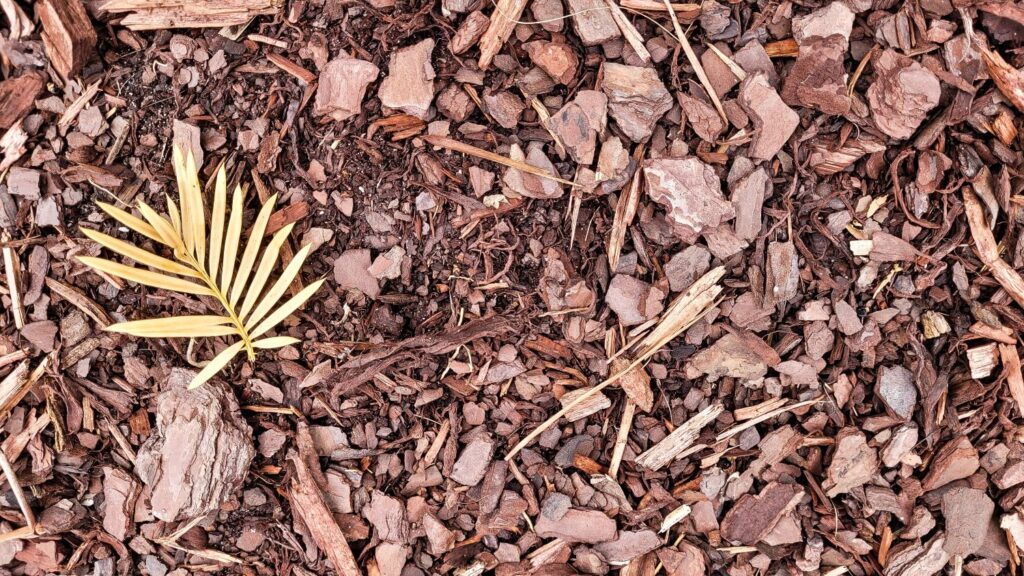
At Weed Pro, we help homeowners all over Atlanta weigh their options, evaluate their space, and pick the mulch that fits their landscape’s style and function.
Whether you’re refreshing a garden bed, revamping your entire yard, or just looking to suppress those pesky weeds, we’ve got the tools, team, and know-how to do it right.
👉 Call or click to get your custom mulch plan today.
❓FAQ: Mulch Questions That Don’t Get Enough Love
Does mulch attract termites or pests?
Organic mulches like bark and pine straw can create moist environments that attract insects if applied too thickly near your home’s foundation. Keep mulch 6–12 inches away from structures, and you’ll be in the clear. Rubber mulch is non-organic and doesn’t attract pests at all.
Can you dye or repaint faded mulch?
Yes! There are mulch refresh sprays that restore color, especially for bark or rubber varieties. These are great for mid-season touch-ups when you don’t want to fully replace your mulch but need that clean look back.
Is there a best mulch for vegetable gardens in Atlanta?
For food-growing areas, stick with natural options like pine straw, bark, or untreated wood chips. Avoid rubber mulch—it’s not designed for edible garden beds and may affect soil health over time.
👉🌺 Flower Beds, Meet Mulch Magic
You’ve seen how mulch types stack up—now let’s focus on their best use case. Head to our next blog: “Using Mulch for Weed Control in Alpharetta Flower Beds” to see how mulch can beautify and defend your garden beds.

